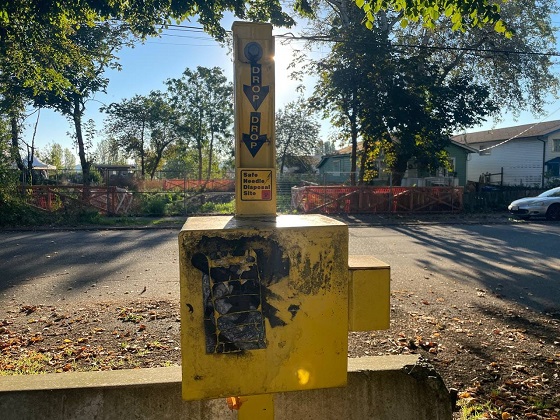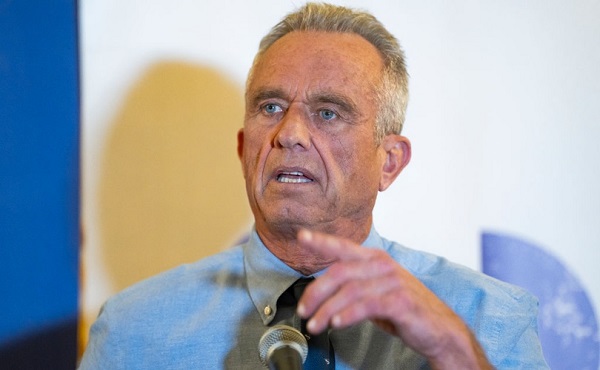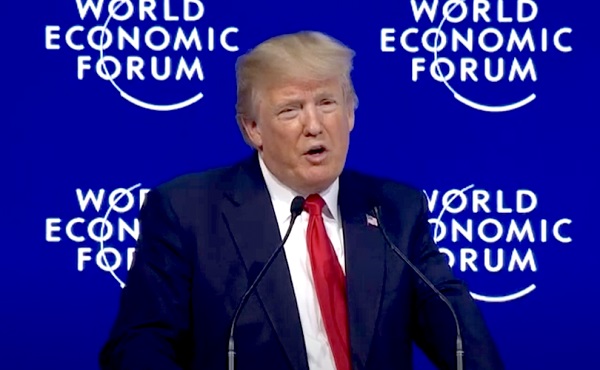armed forces
Sapped of both hard and soft power, Canada needs action to keep up in a dangerous world

From the MacDonald Laurier Institute
By Charles Burton
Ottawa’s vexing indifference toward national defence and security will not serve or protect Canada.
Speaking to an international crowd of leaders, ministers and other representatives who had gathered earlier this month in Beijing for a forum that marked 10 years of China’s Belt and Road Initiative global infrastructure program, Chinese leader Xi Jinping declared that “changes of the world, of our times, and of historical significance are unfolding like never before.”
Quite right. Will the Russian invasion of Ukraine be resolved without war with NATO? Will armed conflict in the Middle East, fomented by Iran, spiral into a regional war? Would China open a third front by invading Taiwan? If the atrocious provocations to war by Iran, Russia and China develop simultaneously on three fronts – setting off a world war in Asia, the Middle East and Indo-Pacific – where will Canada stand?
Canada should be a respected and resonant voice in the international arena. We are both an Atlantic and a Pacific nation, and our heralded history of peacekeeping involvement in the Middle East dates back to the Suez Crisis of the 1950s and Lester Pearson’s Nobel Prize. In the Second World War, prime minister William Lyon Mackenzie King sat down for four power meetings with Franklin Delano Roosevelt, Winston Churchill and Joseph Stalin.
Canada once mattered. But those days are long gone.
Years of underfunding defence and freeloading on the U.S. for our national security are leading to Canada being phased out. The significance of the Group of Seven and the Five Eyes intelligence alliance has become equalled or overtaken by that of organizations from which Canada is excluded, such as the Quint and AUKUS, which is aimed at Indo-Pacific security even though Britain is not a Pacific nation. Despite reportedly telling Western leaders and officials at the G20 summit that it had credible intelligence that India’s government was involved in the assassination of a Canadian citizen, no leader was willing to publicly criticize Narendra Modi. Our soft power authority has faded.
Given our pathetically depleted hard power capabilities, Canada needs a reality check on what we can actually do with the limited resources at our disposal.
First of all, it is time to stop mouthing hollow bromides about “our” north, and actually reorient our defence to establish a meaningful presence in the Arctic. China now defines itself as a “near-Arctic nation,” with increased investment in the region and plans around a potential shipping route – a “polar silk road” – that could emerge between melting ice caps; Russia, meanwhile, has argued that much of Canada’s Arctic waters actually belongs to them. If a major conflict were to arise with Russia and China allied against the U.S. and Canada, our unprotected Arctic could be quickly lost to Beijing and Moscow’s ambitions to expand their territory beyond Europe and East Asia.
Secondly, Canada must protect its northern stores of critical minerals. We talk a good game on this, but so far that has mostly been political bafflegab. Beyond making an obvious statement about our sovereignty, developing our northern resources is a productive way to create economic opportunities for northern Indigenous communities, and shows our allies that we are serious about stopping China from monopolizing valuable minerals in Canadian soil that are vital to the world’s high-tech future.
Finally, Ottawa needs to step up and meet the challenge to Canada’s security from Iran, Russia and China. There was tough talk in Parliament earlier this year about foreign actors manipulating our democratic institutions, but there has yet to be legislation tabled to create so much as a foreign agent registry. The federal government’s response to the 34 well-considered recommendations of a House of Commons special committee on Canada-China relations released in May was dismissive.
Even the Commons subcommittee on international human rights’ report on Tibetan residential schools in China was effectively ignored. One would have thought this issue would be something Canada could take a lead on, considering our history in this area. But in responding to the report, Foreign Affairs Minister Mélanie Joly didn’t even acknowledge the recommendation that Canada sanction Chinese Communist officials complicit in their residential schools policy.
What is the point of investing considerable resources into parliamentary committees if the government sees them only as an irritant to be checked, rather than a positive contributor to national policy development?
We are facing an axis of cold-blooded dictators determined to destroy Western-supported stability and order. With global tensions more combustible than at any time in a generation or more, Ottawa’s vexing indifference toward national defence and security will not serve or protect Canada.
We need to refocus what remains of our military and security resources to what really matters, and fast.
Charles Burton is a senior fellow at the Macdonald-Laurier Institute, non-resident senior fellow of the European Values Center for Security Policy in Prague, and former diplomat at Canada’s embassy in Beijing.
armed forces
Canadian military deployed ‘gender advisors’ to Ukraine, Haiti at taxpayers’ expense
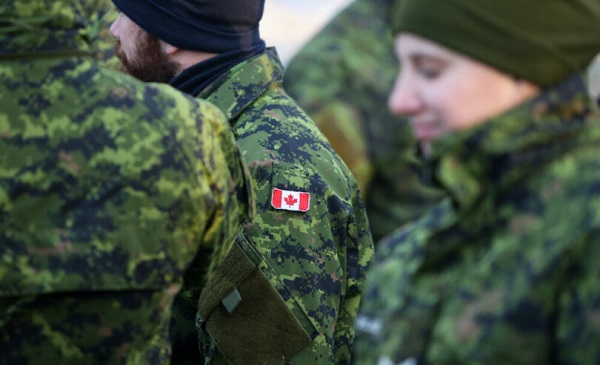
From LifeSiteNews
The Canadian Armed Forces has been pushing a radical LGBT agenda under Prime Minister Justin Trudeau, with the latest example being ‘Task Force Gender Advisors’ deployed in war-hit nations, such as Haiti and Ukraine.
Canada’s military has been actively pushing a woke pro-LGBT agenda on the world stage, with the latest example being its deployment of “task force gender advisors” internationally in war-hit nations, such as Haiti and Ukraine.
The “gender advisors” initiative is noted in the 2024 Departmental Report of the Canadian Armed Forces (CAF). This has resulted in it drawing a sharp rebuke from veterans who wonder why the military is spending money on pushing the LGBT agenda abroad.
The CAF report notes how in Poland, for instance, the “Task Force Gender Advisor was involved in all aspects of this training mission and supported the local Defence Attaché in connecting with local and Ukraine-based non-governmental organizations and interested parties.”
The report noted how the “gender advisor” as well as “gender focal points” were sent to military missions in Eastern Europe, including Ukraine, Poland, and Latvia throughout 2023.
In war-torn Haiti, “intersectional factors (were) being applied towards stabilization and humanitarian efforts,” via an “Operations HORIZON and PROJECTION” initiative.
This initiative is part of the third “National Action Plan on Women, Peace, and Security for 2023-2029.” This is a program that looks to advance pro-LGBT ideology, such as concepts of different “genders,” in all military operations.
Under Prime Minister Justin Trudeau, the CAF, as well as all government departments, have pushed an ever-increasing woke agenda, as well as a host of so-called diversity, equity, and inclusion (DEI) policies in place.
The military’s action plan notes how there are no less than three full-time “gender advisors” who are in the CAF at all levels.
“A Gender Advisor is a full-time position, usually a military position, and a Gender Focal Point is a part-time position; these exist to support Commanders in the application of GBA+ and gender perspectives in both the institutional and operational realms. Gender Focal Points are positioned throughout CAF. In-theatre, there is a minimum of one GFP on all named missions,” notes a Department of National Defence report.
The president of Veterans for Freedom, Andrew MacGillivray, blasted the woke DEI policies, saying the program has morphed into a “useless overbearing policy that has infiltrated every aspect of the Canadian Armed Forces.”
He noted that war-torn nations most likely don’t care “about gender nonsense being pushed by Canada when they are struggling to keep people alive.”
Since Trudeau became PM, the CAF has become increasingly woke and has been forcing LGBT ideology on many of its personnel. It has also seen recruitment plummet to all-time lows.
As reported by LifeSiteNews, earlier this year, Canada’s first “transgender” military chaplain was suspended for alleged sexual harassment, after he reportedly sought to grope a male soldier at the Royal Military College while drunk.
Canada’s military has spent millions of taxpayer dollars on pro-DEI polls, along with guest speakers, presentations, and workshops, as well as LGBT flags. The workshops covered topics including “the gendered nature of security,” while one talk discussed “integrating gender and diversity perspectives.”
In 2021, the defence department revealed that it has two separate committees and eight programs that worked to appoint homosexual advisors to “innovate” religious instruction and gender-neutral uniforms.
In June of 2023, the Canadian military was criticized for “raising the pride flag” in honor of the so-called “2SLGBTQI+ communities.”
armed forces
Top Brass Is On The Run Ahead Of Trump’s Return
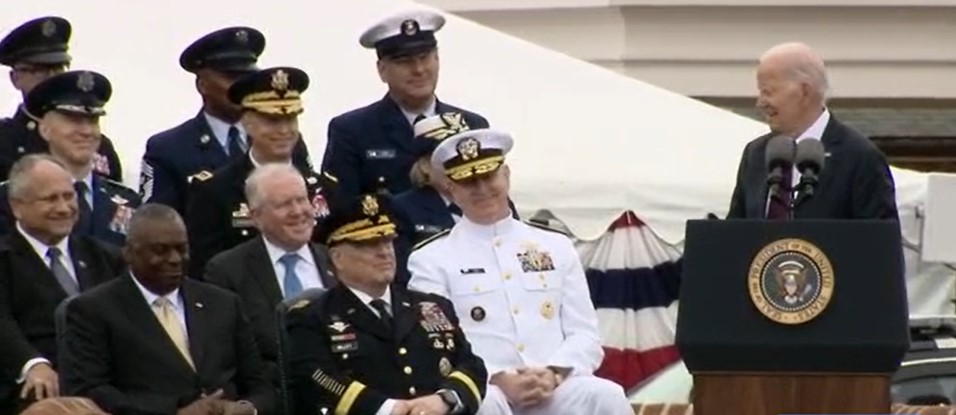

From the Daily Caller News Foundation
By Morgan Murphy
With less than a month to go before President-elect Donald Trump takes office, the top brass are already running for cover. This week the Army’s chief of staff, Gen. Randy George, pledged to cut approximately a dozen general officers from the U.S. Army.
It is a start.
But given the Army is authorized 219 general officers, cutting just 12 is using a scalpel when a machete is in order. At present, the ratio of officers to enlisted personnel stands at an all-time high. During World War II, we had one general for every 6,000 troops. Today, we have one for every 1,600.
Right now, the United States has 1.3 million active-duty service members according to the Defense Manpower Data Center. Of those, 885 are flag officers (fun fact: you get your own flag when you make general or admiral, hence the term “flag officer” and “flagship”). In the reserve world, the ratio is even worse. There are 925 general and flag officers and a total reserve force of just 760,499 personnel. That is a flag for every 674 enlisted troops.
The hallways at the Pentagon are filled with a constellation of stars and the legions of staffers who support them. I’ve worked in both the Office of the Secretary of Defense and the Joint Chiefs of Staff. Starting around 2011, the Joint Staff began to surge in scope and power. Though the chairman of the Joint Chiefs is not in the chain of command and simply serves as an advisor to the president, there are a staggering 4,409 people working for the Joint Staff, including 1,400 civilians with an average salary of $196,800 (yes, you read that correctly). The Joint Staff budget for 2025 is estimated by the Department of Defense’s comptroller to be $1.3 billion.
In contrast, the Secretary of Defense — the civilian in charge of running our nation’s military — has a staff of 2,646 civilians and uniformed personnel. The disparity between the two staffs threatens the longstanding American principle of civilian control of the military.
Just look at what happens when civilians in the White House or the Senate dare question the ranks of America’s general class. “Politicizing the military!” critics cry, as if the Commander-in-Chief has no right to question the judgement of generals who botched the withdrawal from Afghanistan, bought into the woke ideology of diversity, equity and inclusion (DEI) or oversaw over-budget and behind-schedule weapons systems. Introducing accountability to the general class is not politicizing our nation’s military — it is called leadership.
What most Americans don’t understand is that our top brass is already very political. On any given day in our nation’s Capitol, a casual visitor is likely to run into multiple generals and admirals visiting our elected representatives and their staff. Ostensibly, these “briefs” are about various strategic threats and weapons systems — but everyone on the Hill knows our military leaders are also jockeying for their next assignment or promotion. It’s classic politics
The country witnessed this firsthand with now-retired Gen. Mark Milley. Most Americans were put off by what they saw. Milley brazenly played the Washington spin game, bragging in a Senate Armed Services hearing that he had interviewed with Bob Woodward and a host of other Washington, D.C. reporters.
Woodward later admitted in an interview with CNN that he was flabbergasted by Milley, recalling the chairman hadn’t just said “[Trump] is a problem or we can’t trust him,” but took it to the point of saying, “he is a danger to the country. He is the most dangerous person I know.” Woodward said that Milley’s attitude felt like an assignment editor ordering him, “Do something about this.”
Think on that a moment — an active-duty four star general spoke on the record, disparaging the Commander-in-Chief. Not only did it show rank insubordination and a breach of Uniform Code of Military Justice Article 88, but Milley’s actions represented a grave threat against the Constitution and civilian oversight of the military.
How will it play out now that Trump has returned? Old political hands know that what goes around comes around. Milley’s ham-handed political meddling may very well pave the way for a massive reorganization of flag officers similar to Gen. George C. Marshall’s “plucking board” of 1940. Marshall forced 500 colonels into retirement saying, “You give a good leader very little and he will succeed; you give mediocrity a great deal and they will fail.”
Marshall’s efforts to reorient the War Department to a meritocracy proved prescient when the United States entered World War II less than two years later.
Perhaps it’s time for another plucking board to remind the military brass that it is their civilian bosses who sit at the top of the U.S. chain of command.
Morgan Murphy is military thought leader, former press secretary to the Secretary of Defense and national security advisor in the U.S. Senate.
-
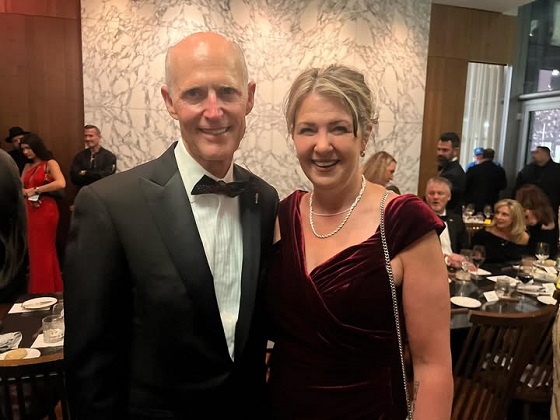
 Alberta2 days ago
Alberta2 days agoPremier Danielle Smith In Washington for Trump Inauguration Promoting a New Era of Partnership with the U.S.
-
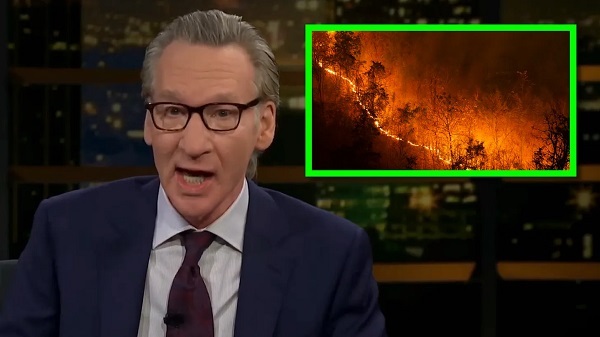
 International2 days ago
International2 days agoBill Maher Torches California’s Disastrous Wildfire Response in Brutal Monologue
-
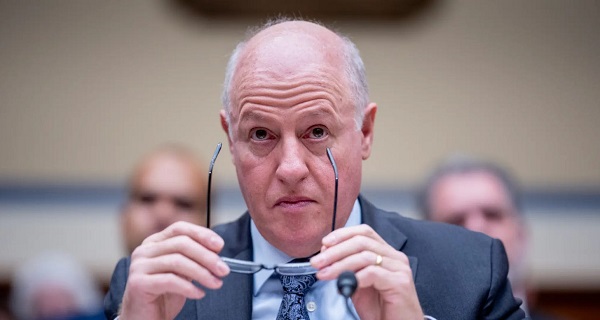
 COVID-192 days ago
COVID-192 days agoBREAKING: Days before Trump Inauguration HHS fires doctor in charge of gain of function research project
-
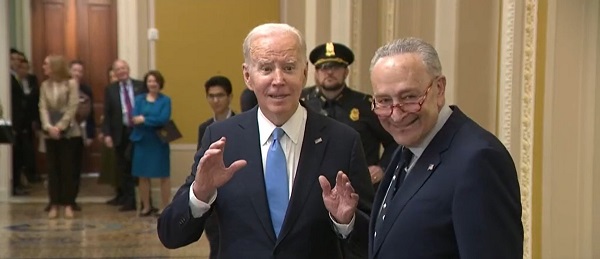
 Daily Caller21 hours ago
Daily Caller21 hours agoBiden Pardons His Brother Jim And Other Family Members Just Moments Before Trump’s Swearing-In
-
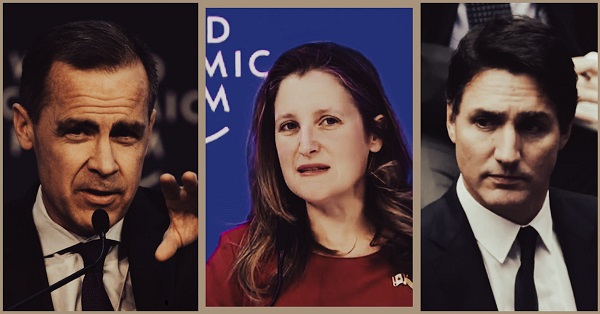
 National2 days ago
National2 days agoLiberal Leadership Launch…
-
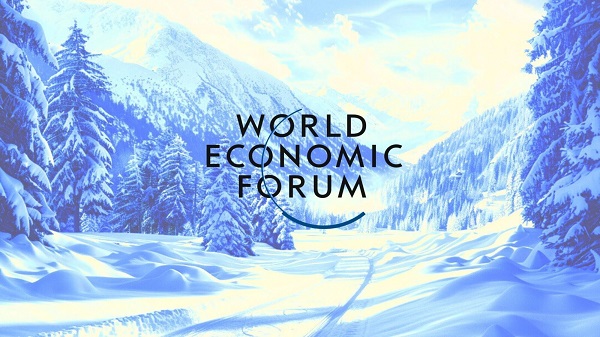
 Censorship Industrial Complex1 day ago
Censorship Industrial Complex1 day agoWEF Davos 2025: Attendees at annual meeting wrestling for control of information
-

 Business1 day ago
Business1 day agoTikTok Restores Service After US Shutdown Amid Trump Deal
-

 Artificial Intelligence1 day ago
Artificial Intelligence1 day agoCanadian Court Upholds Ban on Clearview AI’s Unconsented Facial Data Collection


